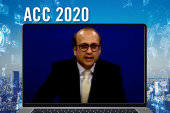‘Smart’ Approach Wins for Post-PCI Antiplatelet Prescribing
With more power than past trials, this 20,000-person meta-analysis should support a guideline change, experts say.

Selecting a post-PCI antiplatelet regimen based on platelet function or genetic testing seems to improve both efficacy and safety, according to a new meta-analysis. Its authors say the results support the next frontier of personalized medicine despite the lack of randomized trial evidence.
Prior studies, like last year’s TAILOR-PCI, have failed to establish the superiority of a guided antiplatelet strategy over standard therapy, but proponents say no trial so far has been accurately powered to do so.
This 20,000-patient meta-analysis, which combined the TAILOR-PCI, POPular Genetics, TROPICAL-ACS, and PHARMCLO trials, among others, was designed to overcome prior research pitfalls, lead author Mattia Galli, MD (Catholic University of the Sacred Heart, Rome, Italy, and University of Florida College of Medicine, Jacksonville), told TCTMD.
“I want to underline the strength of our analysis and the importance that it could have on the field, because the field was actually stuck due to the fact that randomized controlled trials have a lot of limitations,” he said. “It was a perfect scenario where a meta-analysis can improve the evidence, because sometimes with randomized controlled trials if they are not perfectly designed, you can have a negative result. But the benefit of the strategy is very clear.”
Charanjit Rihal, MD (Mayo Clinic, Rochester, MN), who co-authored another meta-analysis of genetics-guided antiplatelet therapy published last month, told TCTMD there is now enough evidence to support changing the guidelines.
All of the data “confirms that a smart approach to antiplatelet therapy may be the best thing for the community to gravitate toward,” he said. “It’s not the be all and end all, but it is an important determinant of outcomes. . . . I believe that all the evidence is converging, [and] that we as clinicians should begin to pay attention.”
The study was published this week online ahead of print in the Lancet.
Guided Strategy Dominates
For the meta-analysis, Galli and colleagues included 20,743 patients from 11 randomized controlled trials who received post-PCI antiplatelet therapy guided by either platelet function or genetic testing or standard prescribing.
Compared with a standard strategy, guided therapy was associated with a significantly lower rates of trial-defined primary major adverse cardiovascular events (RR 0.78; 95% CI 0.63-0.95) and a numerically lower rate of any bleeding (RR 0.88; 95% CI 0.77-1.01). Individual outcomes of cardiovascular death, MI, stent thrombosis, stroke, and minor bleeding were each lower with a guided regimen. There were no differences in all-cause death or major bleeding.
Breaking down the strategies used, a guided escalation approach to prescribing was associated with a reduction in ischemic events (RR 0.74; 95% CI 0.57-0.95) with no trade-off in bleeding, while a guided de-escalation approach led to less bleeding (RR 0.81; 95% CI 0.68-0.96) with no compromise in efficacy.
In an editorial accompanying the study, Dirk Sibbing, MD, and Adnan Kastrati, MD (both Klinikum der Universität München, Germany), write that while physicians should follow current guidelines when deciding how to prescribe antiplatelet agents, “individualized dual antiplatelet therapy escalation strategies may be desired when thrombotic risk outweighs bleeding risk, and de-escalation strategies may be desired when bleeding risk outweighs thrombotic risk. In this context, platelet-function testing and genetic testing should be considered as helpful tools for guidance of treatment and current guidelines have adopted such concepts as optional strategies, while more and more data has emerged in recent years.”
These strategies can help clinicians to “opt among a variety of individualized therapy concepts that improve patient care,” they continue. “Implementation of phenotyping and genotyping has, however, the potential of offering treatment guidance even in the early postprocedural period, the most eventful period for patients undergoing PCI.”
Forthcoming Hurdles
Rihal noted two main barriers to a greater uptake of a guided approach to antiplatelet therapy. “Number one, we need a point-of-care assay that’s easy—we cannot have a great, big complex assay that's done in a [Clinical Laboratory Improvement Amendments] certified lab that takes 5 days to come back,” he said. “That cannot work. We need a point-of-care assay that can be integrated into our workflow in a routine manner in cath labs, on the floor, wherever.”
In TAILOR-PCI, Rihal explained, the researchers used a Canadian-developed assay that gave a result within an hour, but he is not sure whether that will be developed for commercial use. “If they perceive that clinicians are interested in this approach, then a number of companies could actually develop a point-of-care assay that's highly accurate and rapid and easy to implement,” Rahul said.
The second hurdle is awareness, he continued. “It’s going to take a little while for people to get educated on these [new meta-analyses], to understand them, to debate them, to go back and forth on them.”
Implementation will come in time, especially if the guidelines recognize the advantages of a guided approach, Galli added. Despite the large size of his institution, “we aren’t familiar with these kinds of tools,” he said. “There are some centers which are very focused on that, but the majority of centers all over the world are not very familiar with genetic testing or with platelet-function testing, so they need actually to improve their expertise in that.”
“What we need to do now is translate the research results into clinical practice,” Rihal said. “It’s becoming more of a healthcare delivery question: ‘How can we improve the quality and value of the services we're rendering our patients?’ . . . . If we look at maximizing the value we're delivering to our individual patients, then answers start to fall into place and healthcare institutions and individual practitioners can begin looking at their workflows and updating them and deciding what to do. I feel, and as we've published, that this smart precision medicine approach is the way to go now based on the totality of the evidence.”
Yael L. Maxwell is Senior Medical Journalist for TCTMD and Section Editor of TCTMD's Fellows Forum. She served as the inaugural…
Read Full BioSources
Galli M, Benenati S, Capodanno D, et al. Guided versus standard antiplatelet therapy in patients undergoing percutaneous coronary intervention: a systematic review and meta-analysis. Lancet. 2021;397:1470-1483.
Sibbing D, Kastrati A. Guided P2Y12 inhibitor therapy after percutaneous coronary intervention. Lancet. 2021;397:1423-1425.
Disclosures
- Galli, Rihal, and Kastrati report no relevant conflicts of interest.
- Sibbing reports having received speaker fees and fees for advisory board activities in the area of antithrombotic treatment from Bayer, Sanofi Aventis, Pfizer, Daiichi Sankyo, AstraZeneca, and Roche Diagnostics.





Comments